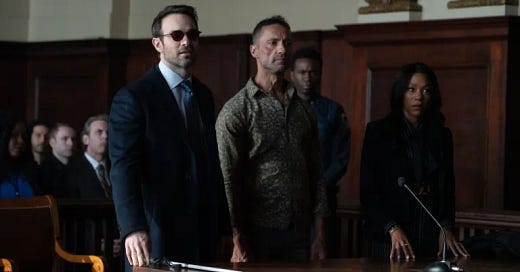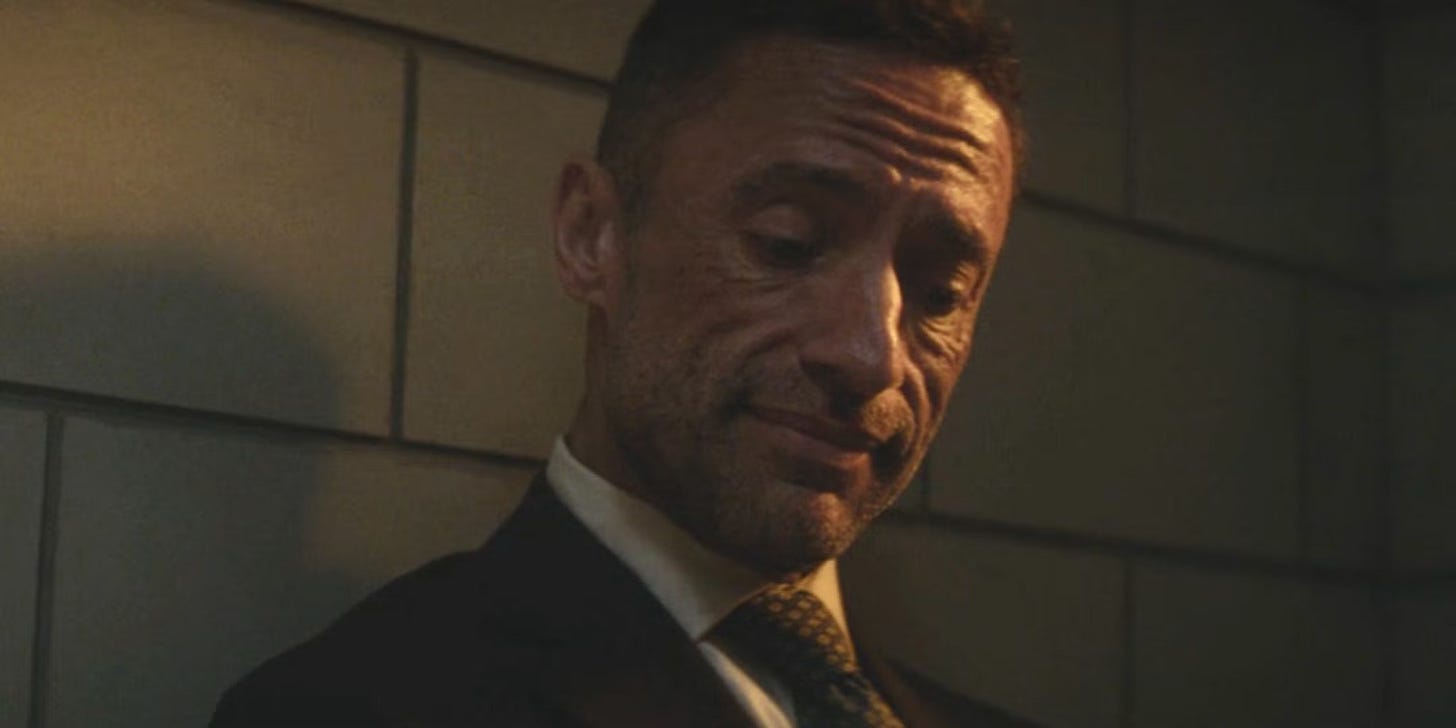Daredevil: Born Again S1 Ep 3 blesses us with another kind of Irish goodbye.
Happy St. Patrick’s Day, everyone.
The Short Take:
This episode does a decent job of weaving Matt Murdock’s own existential issues into a juicy courtroom drama. I very much enjoyed the development of White Tiger/Hector Ayala.
[SPOILER WARNING: This review will contain details from Daredevil: Born Again through Episode 3.]
Image Credit: Den of Geek
The Long Take:
On this fine St. Patrick’s Day, I say, “May the road rise to meet you.” Or, if I’m Daredevil: Born Again, I might say, “May God hold you in the hollow of his hand.”
This week’s episode, “The Hollow of His Hand,” features a heartfelt yet somber toast from Matt Murdock’s new girlfriend, therapist Heather Glenn, as she lifts a glass of the whiskey Matt and Foggy used to break out whenever they’d win a case. She says, “Here’s to a man who cooks, a well-won case, and…Foggy Nelson. May God hold them all in the hollow of his hand.” When I heard this, I thought it sounded familiar. And then I remembered that back in the first episode, Josie, the bartender, cheers Cherry during his retirement party, shouting, “May you be in heaven a full half hour before the Devil knows you’re dead!” I immediately took to the Internet to see what I could find about whether or not these two toasts had a connection.
It turns out all I could find were unreliable sources, websites that were the equivalent of IHeartIreland.com. I promise I checked my usual scholarly avenues, and only came up with a review of choral music for church service and a eulogy. But it does appear, at least colloquially, that both of these regards are considered traditional Irish blessings, albeit of contrasting flavors. The reference to “in the hollow of his hand” comes from the more spiritual blessing that goes like this:
May the road rise up to meet you.
May the wind be always at your back.
May the sun shine warm upon your face;
the rains fall soft upon your fields and until we meet again,
may God hold you in the palm of His hand.
The trickiness for a researcher here lies in the lyrical variation. The less common version of this verse replaces “in the palm of His hand” with “in the hollow of His hand.” If you put either version into YouTube, you’ll find myriad church choir or choral performances featuring these words put to song. But the most famous rendition, it seems, is by a singing group called Celtic Thunder. This group’s American claim to fame is that they paved the way for one of their members to win a reality show prize role on Ryan Murphy’s Glee. Damian McGinty played Rory Flanagan, an Irish exchange student whose first episode was called “Pot O’ Gold.” In my perusal of less formal sources of information, I did notice repeated references to this blessing’s popularity in association with St. Patrick’s Day, and, more specifically, the commercialization of the holiday and commodification of Irish culture. So if you’re getting Lucky Charms vibes from all of this, you may not be wrong.
The other reference that actually mentions Daredevil — I mean, the devil — on the other hand, seems to be the less reverent, less sacred, more pub-friendly blessing. When I searched this one on Youtube, the majority of the results were just remixed clips of Cillian Murphy’s character on Peaky Blinders (a series I never watched but now wish I had) and a barmaid named Shelby, who utters the toast to him. The only song I found was very punk rock/anti-establishment in its sound. And yet, on these pro-Irish, let me teach you about Irish culture blogs, both blessings get mentioned together.
In Daredevil: Born Again, at least, there seems to be a pattern to the invocation of these kinds of blessings. Cherry’s retirement, Foggy’s death, and now Hector Ayala’s death are all goodbyes. Sayings like “May the road rise to meet you” or “may you be in heaven a half hour” are well wishes, but they’re well wishes frequently associated with some kind of parting, including but not limited to death.
Of course, these references could just be a nod to Matt Murdock’s roots in the heavily Irish Catholic neighborhood of Hell’s Kitchen. And to the important role the Church played in Season 1 of the Netflix series. It’s hard to have a hero with devil in their moniker without throwing in a side of better angels and guilt. And even, as I suspect, the series deploys these Irish blessings more as a t-shirt or mug level appropriation of Irish culture, it does seem potentially connected to Matt Murdock ’s own crisis of faith and identity. A crisis he’s long had.
In this week’s episode, there is a very striking shot of Matt in the empty courtroom, in between sessions for Hector Ayala’s trial. As he walks up the aisle, the seats suddenly look like pews in a church. Very churchy choral music plays. We no longer have a priest to whom Matt can give confession as we did in the Netflix series, but a scene like this feels like the closest we’re going to get in this show.
And yet, I can’t help but feel as though there’s something more specific the show is trying to say with these blessings. The hollow of his hand is specifically referring to protection and care, but also control. When we use the phrase “in the hollow of your hand” in a secular context, we basically mean eating out of the palm of your hand or in possession or control. In this episode, Matt thinks he is in control of his disavowal of Daredevil, to the point at which he lectures Hector Ayala about it. He says, “And, for what it’s worth, I think you might be surprised by how much you don’t miss being him.” This line easily doubles as Matt talking to himself. Trying to convince himself that he is fine without being Daredevil. But I think he doth protest too much. The resolution of Ayala’s case, both in and out of the court, is right there as proof that Matt is just in denial.
After Hector calls out Matt for revealing his secret identity without his permission, Matt says, “You know, Hector, if you are acquitted, your White Tiger days are over. You know that, right? You can’t ever put that suit back on.” Once again, this line easily doubles as Matt talking to himself about his Daredevil suit. But Hector’s response muddies Matt’s resolve: “I don’t think you understand. Being the White Tiger is more than putting on a suit. It’s who I am. It’s a calling. I didn’t choose it. It chose me. Might as well ask me to stop breathing.” This, in turn, has to be strong foreshadowing that Matt is fated to revert to his vigilante crimefighting ways. Denying Daredevil is denying himself who he truly is.
There is so much subtext about identity and the self in the episode, most of which is brought up during the trial. The prosecution, The Hawk, poses the question: can a hero who does so many good things be capable of doing a bad thing? His answer is a rhetorical one: “of course.” The notion of superheroes and vigilantism is as much on trial as Hector Ayala. Should someone who has to hide behind a mask be regarded as a hero, or is that designation only reserved for the police? (“Last time I checked, real heroes don’t need to hide.”) And then, through the conversation between Matt and Hector, we have to wrestle with the question of whether or not a masked hero is one person or two people? Matt’s model splits his identity in two separable halves: he doesn’t miss being HIM, as if Daredevil is another person entirely. Hector, on the other hand, views his civilian identity and his superhero identity as one and the same because it’s who he is and is as involuntary and necessary to his existence as breathing.
The most beautiful detail with which to bookend the episode and really give Hector/White Tiger a sense of fully formed character relatively quickly was the coquis, the little frogs that croak in Hector’s homeland of Puerto Rico. To hear the sound as the credits rolled after his death was devastating because you realize Matt couldn’t keep his promise and Hector will never get back there to hear that sound again. But I think the coquis also operate as a metaphor for Hector’s superhero philosophy. Hector says that they sing their name and that thousands of them start calling out to their one and only love. I think it’s no coincidence that Hector thinks of his White Tiger mantle as his calling, wanting to sing his own name even though society and Matt specifically tell him he shouldn’t. There’s a clear sense of self-knowing in the musical declaration of one’s presence. A beauty in the clarity, faith, and even destiny of the coqui’s call.
Meanwhile, Matt Murdock needs to find another form of therapy. He should not have used Hector’s trial as a way to project his own demons onto legal arguments surrounding Hector’s heroics. He’s already lost so much, so it’s painful to think what learning about Hector’s murder will do to Matt just as he seems to have started to heal, willing to say “may the road rise to meet you” to Foggy.
Neither Hector nor Foggy were in the hollow of Matt Murdock’s hand.
Image Credit: Screen Rant
(And no, for the record, I do not think that was actually The Punisher at the end. I subscribe to the theory that many do that this was an Officer-Powell-esque figure (or maybe even Powell himself) who has hypocritically coopted The Punisher’s iconography for their own above the law ends.)





